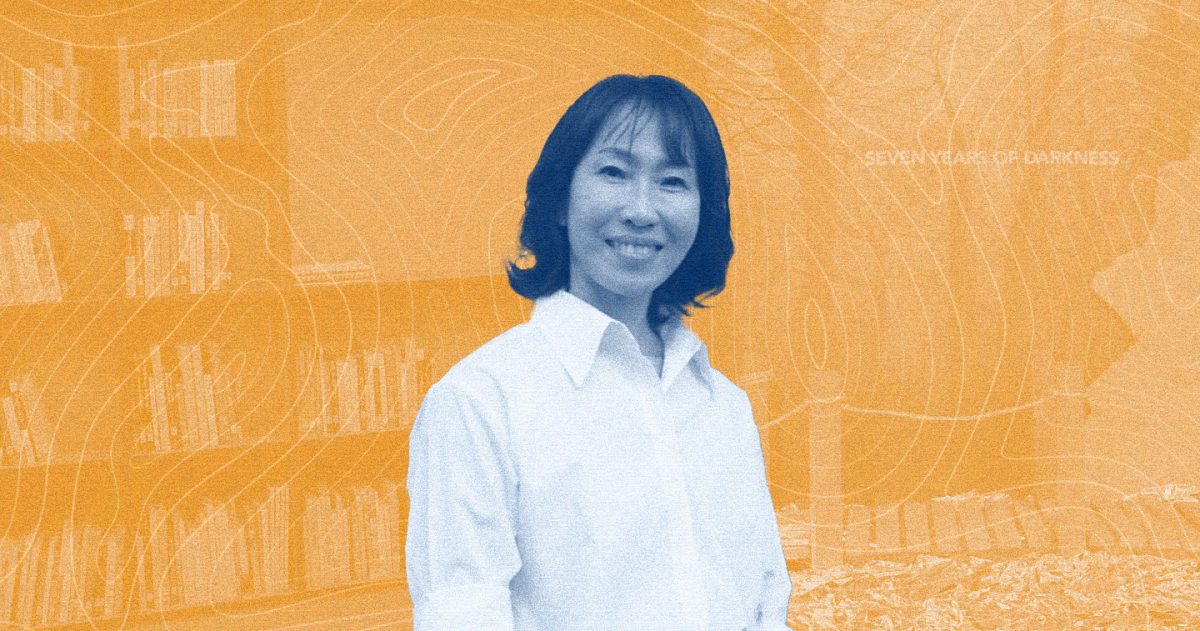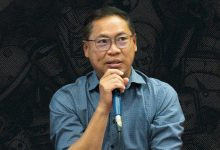MANILA, PHILIPPINES — In a media forum hosted by the Korean Cultural Center (KCC), award-winning author Jeong Youjeong noted that she hopes the local audience would see her as the lovely and charming woman that she is through these events, and not as the scary author many readers perceive her to be because of her internationally acclaimed crime and thriller books. Right when she was introduced, she met guests with her warm personality, topped off with big smiles and unexpected jokes.
At the KCC’s “K-Lit: Turning Pages of Korea” exhibit, some of Jeong Youjeong’s work is showcased alongside two other renowned Korean authors, Cheon Myeongkwan and Son Wonpyung. Her section of the exhibit took on a darker aesthetic compared to her peers to embody the chilling stories that her books exude, specifically the stories told in Seven Years of Darkness and The Good Son, two of her most popular novels. The exhibit runs from October 13 to November 18, 2023, at the KCC, Taguig.
As the special guest for the exhibit’s launch, Jeong went deeper into her personal approach to storytelling, the world she depicts in her works, and kickstarting an era of darker stories out of Korea.







Context mapping: meeting the author
It could be said that Jeong Youjeong’s background as a nurse heavily influenced the type of stories she’s been inclined to write since her debut as a novelist. With help from Korean-English translator Jang Yunjung, she said: “I was able to work in the ER and ICU — the two places in the hospital that’s closest to where people, every day, would be dying or would eventually die.”
Because of this experience, she found herself getting used to death and gore, and could, in turn, easily integrate it to her stories: “If I put these in my novels, readers would be shocked and would not be able to predict what would happen next in the story,” she noted.
With this, Jeong developed a keen interest on exploring the “dark side of humanity,” or the moments when the “inner beast” comes out of us. As she put it, every author’s choice of stories to tell is heavily impacted by their backgrounds and their curiosities growing up, citing Stephen King’s depiction of the evil side of humans and Ernest Hemingway’s exploration of how humans react when faced with death as some of her biggest influences. For her, it is probing the free will of human beings that has inexplicably roused her interest.
“I was focused on the free will of humans, and the choices humans make as they continue their life. I would say that free will is related to the inner beast we have. Everyone has that in our hearts, and in our minds, and how that inner beast will suddenly come out, damaging our lives and ending up in ruins. Sometimes people make mistakes by taking the wrong path; sometimes we manage to do the righteous thing. But in my stories, I focus on those people taking the wrong path and making their mistakes, and how that will ruin their lives eventually,” she explained.
Story writing: the creative process
Jeong sees Stephen King as her literary mentor, despite never meeting him. She treats his novels as text books to study and analyze to master her craft in the genre: “Since I was not able to get [formal] education as a literature writer, I would read his books, analyze every bit of the stories, and even transcribe the actual lines from the book itself. That’s how I studied, and I also looked at the cause and effect relationship of the different cases that were tackled in his novels.”
“Stephen King is my teacher; he taught me how to write. And readers noticed that Stephen King ‘aesthetic’ [in my books] because I’ve been reading his books ever since. But recently, readers commented that now they can see my own color [in my work] more and that [my voice] is now a lot stronger than before,” she added.
With King’s novels as her main reference material, it’s no wonder how Jeong Youjeong has been able to implement such detailed storytelling in her own works. In fact, she described how, when she writes, she plans and organizes everything before writing anything: “Some writers are capable of writing from one to 10 without any prior planning or organization, as if they’re bewitched with some magical being. For my case, that’s not the way I write.”
She went on, “I want it organized. I want to plan it in advance, setting the purpose or the theme of the story, and going from the beginning until the end; not even a fly can fly around inside my world that I built without my control. That’s how I keep the storyline controlled and aligned as much as possible.”
In building her world, she also studies a lot in preparation. She noted the importance of allocating time to research, speak with subject experts and professionals, and put in the effort to build every detail of her story before deeming it ready for actual writing — almost as if she’s the god of an imagined world that’s very much a reflection of the world we live in today.
However, she also admitted the difficulties of protecting this created universe as a writer, or keeping everything exactly the way she designed it to be and not conform to external factors that might influence the story.
“I believe that writers should not be swayed by the current habits and trends or the type of stories readers want to read most nowadays,” she shared. “We have to focus on the stories we want to tell as authors, and not write stories [based on] what’s the most favorable or liked by the readers. We have to have our own logical way in building that story, and we have to go for it even if it won’t be the most trending or popular style.”
“Because of this, I think writers would need luck also aside from all the efforts we do because despite those efforts, the story might not be liked even after the death of the writer. It has to go hand in hand. If the writers still continue to write the story that will be the most favorable to the taste of the readers, not based on their own preferences, then I think there’s a problem with that.”












World-building and-influencing: Depicting K-culture
If Jeong Youjeong wrote based on what Korean readers were more inclined to read at the time, she may not be spearheading the crime and thriller genre today. She noted that in Korea, majority of books published by local authors are in the general fiction collection, and only very few authors venture outside of it. With this, she has put it upon herself to depict not just the relatable and beautiful sides of Korean society, but also the parts often buried deep because of its disturbing images.
“When we watch K-Dramas, we tend to think that Korea is a place that is perfect and beautiful. But then, I want to say that there’s always the bright and dark side of every place on Earth. That’s the same for Korea. And I believe that a lot of people are already publicizing how bright, happy and beautiful [the country] is, so this time I’m going to be the ambassador of the dark side of Korea. I think everyone can relate to the fact that it’s actually a prevalent issue around the world; we all have our dark and bright side,” she emphasized.
With this, Jeong also shared her personal wish that her bright side would be showcased the more she meets her readers, as she not only aspires to be a successful crime and thriller novelist, but a dynamic writer across genres as well. “[This] is not happening in Korea, but maybe in the Philippines, I will be known as a humorous and witty writer,” she joked. In fact, she hopes that one day she would also be able to publish a romance novel — a stark difference from the worlds and stories she’s known for today.
In light of all of this, it’s clear that Jeong Youjeong is a writer who believes in the diversity of humanity, insofar as she makes it her personal mission to showcase the different sides of society — may it be for something as complex as morality, or as seemingly simple as choosing which genre she wants to focus on next. Because of her dynamism as a storyteller, she’s definitely an author whose works we’re excited to see more of in the future, and whose worlds we’re looking forward to exploring more through her novels.
Today, though, her proficiency in painting the dark side of humanity through her words shines the brightest.
Follow KCC for more information: https://www.facebook.com/KoreanCulturalCenterPH/








